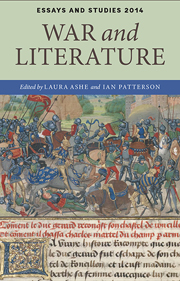Book contents
- Frontmatter
- Contents
- List of Illustrations
- Notes on Contributors
- Preface
- I IDEOLOGIES
- II INTERPRETATIONS
- III AFTERMATHS
- A Feeling for Numbers: Representing the Scale of the War Dead
- The Guilt of the Noncombatant and W. H. Auden's ‘Journal of an Airman’
- Does Tolstoy's War and Peace Make Modern War Literature Redundant?
- Index
A Feeling for Numbers: Representing the Scale of the War Dead
from III - AFTERMATHS
Published online by Cambridge University Press: 05 October 2014
- Frontmatter
- Contents
- List of Illustrations
- Notes on Contributors
- Preface
- I IDEOLOGIES
- II INTERPRETATIONS
- III AFTERMATHS
- A Feeling for Numbers: Representing the Scale of the War Dead
- The Guilt of the Noncombatant and W. H. Auden's ‘Journal of an Airman’
- Does Tolstoy's War and Peace Make Modern War Literature Redundant?
- Index
Summary
The purpose of poetry is to remind us
how difficult it is to remain just one person.
Josef stalin's claim that ‘one death is a tragedy, a million deaths … a statistic’ we might take as an aesthetic and moral gloss on another well-known comment, this one attributed to Napoleon Bonaparte: ‘A man like me does not give a shit about the lives of a million men.’ Stalin's statement makes two assumptions that this essay will question. It assumes that moral feeling – the sort formalised in tragedy – operates on the level of the individual, the one, and is not susceptible to multiplication (or, for that matter, division). It assumes additionally that statistics, the signs for large aggregates of human beings, do not occasion moral feeling. Apparently we do not feel the deaths of a million men with anything like the force we feel for the death of one, ‘a man’, as Napoleon says, ‘like me’.
Stalin contributes to an ongoing debate in moral philosophy, set here in the context of modern mass warfare, a context embracing the Napoleonic era as well as our own. The terms of the debate and its governing assumptions were laid out helpfully, if bluntly, by C. S. Lewis in 1957. Writing in the gloom of the Cold War and against a utilitarian outlook, Lewis argued that none of us can possibly experience suffering on a scale other than that of the single person.
- Type
- Chapter
- Information
- War and Literature , pp. 185 - 204Publisher: Boydell & BrewerPrint publication year: 2014

